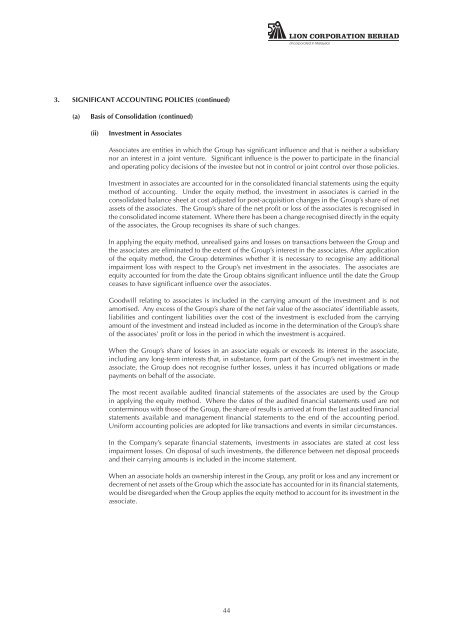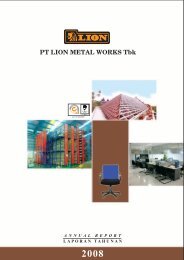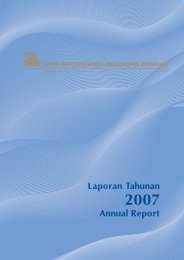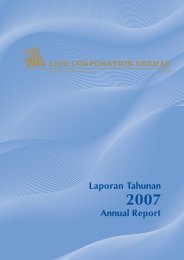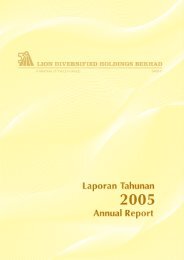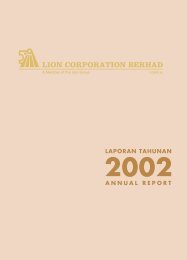continued - The Lion Group
continued - The Lion Group
continued - The Lion Group
Create successful ePaper yourself
Turn your PDF publications into a flip-book with our unique Google optimized e-Paper software.
3. SIGNIFICANT ACCOUNTING POLICIES (<strong>continued</strong>)<br />
(a) Basis of Consolidation (<strong>continued</strong>)<br />
(ii) Investment in Associates<br />
Associates are entities in which the <strong>Group</strong> has significant influence and that is neither a subsidiary<br />
nor an interest in a joint venture. Significant influence is the power to participate in the financial<br />
and operating policy decisions of the investee but not in control or joint control over those policies.<br />
Investment in associates are accounted for in the consolidated financial statements using the equity<br />
method of accounting. Under the equity method, the investment in associates is carried in the<br />
consolidated balance sheet at cost adjusted for post-acquisition changes in the <strong>Group</strong>’s share of net<br />
assets of the associates. <strong>The</strong> <strong>Group</strong>’s share of the net profit or loss of the associates is recognised in<br />
the consolidated income statement. Where there has been a change recognised directly in the equity<br />
of the associates, the <strong>Group</strong> recognises its share of such changes.<br />
In applying the equity method, unrealised gains and losses on transactions between the <strong>Group</strong> and<br />
the associates are eliminated to the extent of the <strong>Group</strong>’s interest in the associates. After application<br />
of the equity method, the <strong>Group</strong> determines whether it is necessary to recognise any additional<br />
impairment loss with respect to the <strong>Group</strong>’s net investment in the associates. <strong>The</strong> associates are<br />
equity accounted for from the date the <strong>Group</strong> obtains significant influence until the date the <strong>Group</strong><br />
ceases to have significant influence over the associates.<br />
Goodwill relating to associates is included in the carrying amount of the investment and is not<br />
amortised. Any excess of the <strong>Group</strong>’s share of the net fair value of the associates’ identifiable assets,<br />
liabilities and contingent liabilities over the cost of the investment is excluded from the carrying<br />
amount of the investment and instead included as income in the determination of the <strong>Group</strong>’s share<br />
of the associates’ profit or loss in the period in which the investment is acquired.<br />
When the <strong>Group</strong>’s share of losses in an associate equals or exceeds its interest in the associate,<br />
including any long-term interests that, in substance, form part of the <strong>Group</strong>’s net investment in the<br />
associate, the <strong>Group</strong> does not recognise further losses, unless it has incurred obligations or made<br />
payments on behalf of the associate.<br />
<strong>The</strong> most recent available audited financial statements of the associates are used by the <strong>Group</strong><br />
in applying the equity method. Where the dates of the audited financial statements used are not<br />
conterminous with those of the <strong>Group</strong>, the share of results is arrived at from the last audited financial<br />
statements available and management financial statements to the end of the accounting period.<br />
Uniform accounting policies are adopted for like transactions and events in similar circumstances.<br />
In the Company’s separate financial statements, investments in associates are stated at cost less<br />
impairment losses. On disposal of such investments, the difference between net disposal proceeds<br />
and their carrying amounts is included in the income statement.<br />
When an associate holds an ownership interest in the <strong>Group</strong>, any profit or loss and any increment or<br />
decrement of net assets of the <strong>Group</strong> which the associate has accounted for in its financial statements,<br />
would be disregarded when the <strong>Group</strong> applies the equity method to account for its investment in the<br />
associate.<br />
44


